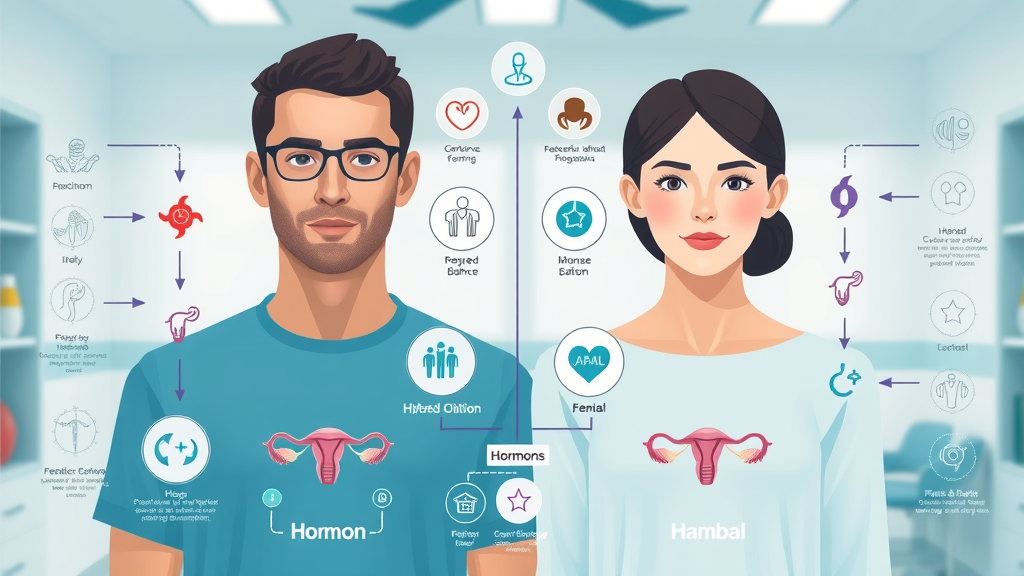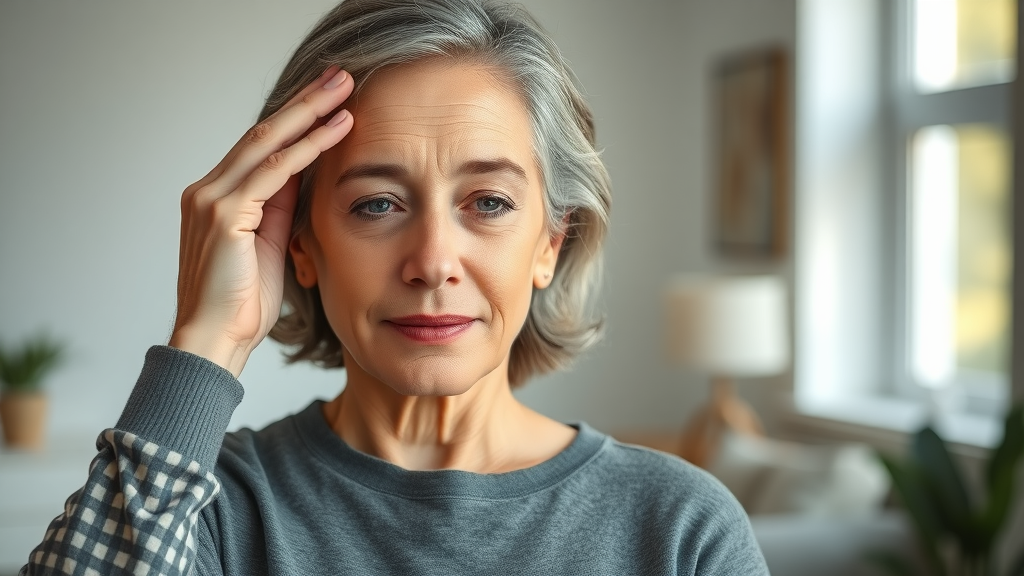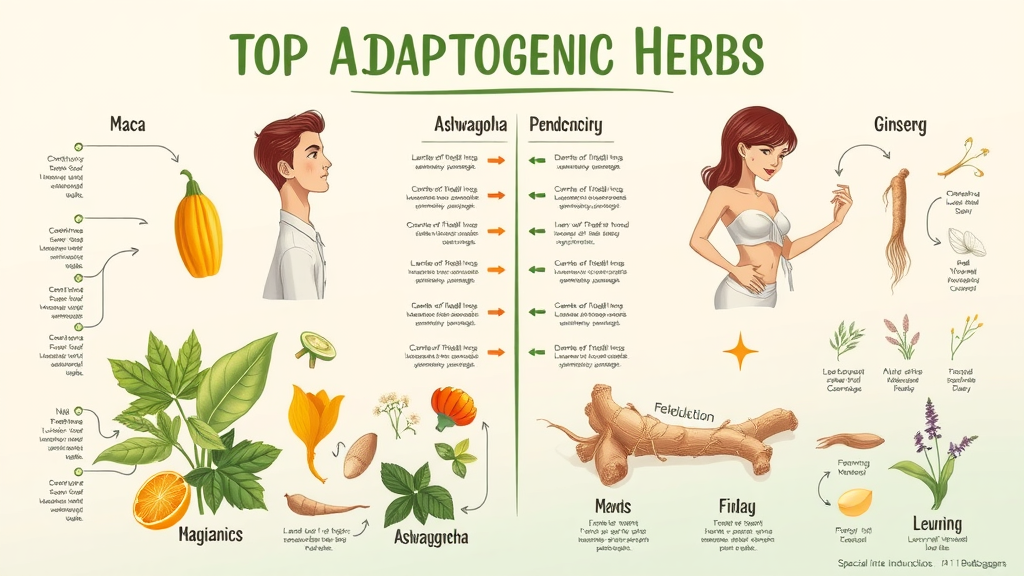"Up to 80% of women experience menopause symptoms, while around 40% of men over 45 report symptoms linked to hormonal imbalance. Yet, adaptogenic herbs show promise in supporting hormone balance across both genders."
Did you know: Most women face menopause symptoms at some point, and a surprising number of men—especially older men—experience hormonal changes affecting their sexual health, mood, and energy? Hormonal balance plays a crucial role in quality of life for both women and men. Whether you're dealing with hot flashes, low libido, or changes in fertility, understanding how adaptogenic herbs can support hormone health could transform your journey through life’s stages. In this comprehensive guide, you’ll uncover evidence-based strategies for navigating menopause symptoms, boosting male fertility , and addressing hormonal shifts with confidence and care.
Understanding Hormone Balance: The Link Between Menopause Symptoms and Male Fertility
Hormone balance lies at the heart of reproductive health for both men and women. When your endocrine system is functioning well, hormones like estrogen and progesterone (primarily in women) and testosterone (in men) are maintained at optimal levels. But as life progresses, especially during moments like menopause or male menopause (andropause), these hormone levels naturally fluctuate, often leading to uncomfortable or disruptive symptoms. Menopause symptoms for women and issues such as low sex drive, erectile dysfunction, and low testosterone in men are two sides of the same coin—signals that hormonal shifts deserve attention.
Since reproductive hormones regulate more than just the menstrual cycle or sperm production, their balance impacts energy, mood, and even cardiovascular disease and metabolic function. By addressing menopause symptoms and fostering male fertility , you’re supporting holistic health across all life stages. The journey to stable hormone balance isn’t limited to one gender—both men and women benefit from targeted approaches that respect their unique physiological needs, enhancing their quality of life whether tackling symptoms of male menopause or navigating postmenopausal changes.
-
What is hormone balance?
-
Why menopause symptoms and male fertility are two sides of the hormone equation
-
Connection to reproductive health at every life stage

What You'll Gain From Exploring Adaptogenic Herbs for Menopause Symptoms and Male Fertility
By delving deeper into the world of adaptogenic herbs and their role in hormonal changes , you’ll gain practical tools and up-to-date scientific insights for managing menopause symptoms, addressing low testosterone, and supporting male fertility. You'll come away able to:
-
Identify hormonal changes during menopause and andropause (male menopause)
-
Pinpoint the most impactful adaptogenic herbs for each unique need
-
Build strategies for working with a care provider to personalize hormone-optimizing routines and weigh the benefits of replacement therapy versus herbal support
Hormonal Changes Across Genders: Menopause Symptoms, Male Menopause, and Reproductive Health
Key Hormonal Changes During Menopause: What Every Woman Should Know
As women transition through life, they encounter distinct phases tied to menopause symptoms : perimenopause, menopause, and postmenopause . During these phases, estrogen and progesterone levels begin fluctuating and then dramatically decline—especially after menopause is reached (typically marked by 12 consecutive months without a menstrual cycle). The drop in estrogen, in particular, triggers a cascade of changes: classic hot flashes, night sweats, low libido, mood swings, and sometimes cognitive symptoms like brain fog. For many menopausal women, these shifts can disrupt sleep, challenge daily productivity, and strain emotional wellbeing.
The physical changes are only part of the process. Emotional and cognitive symptoms—from anxiety and depression to forgetfulness—are common. Some women notice their skin texture changes, their metabolism shifts, or their risk for vascular disease and heart disease increases. While not everyone experiences menopause symptoms with the same intensity, understanding the hormonal foundation underlying these effects is key for effective management, whether through lifestyle, adaptogenic herbs, or medical approaches.
-
Stages of menopause: Perimenopause, menopause, and postmenopause
-
Drop in estrogen and progesterone
-
Physical, emotional, and cognitive menopause symptoms

What is Male Menopause? Andropause, Symptoms of Male Menopause, and Testosterone Level Fluctuations
Although the term "menopause" is most often associated with women, men also undergo significant hormonal changes as they age—a process known as andropause or “male menopause.” This gradual decline in testosterone levels often begins in the late 30s or early 40s, accelerating in older men. Symptoms of male menopause can include fatigue , low libido , erectile dysfunction, mood swings, and even cognitive challenges. Unlike the more abrupt hormonal shift in female menopause, andropause is a subtle and often overlooked process that can impact a man’s sex drive, physical vitality, and overall reproductive health.
Low testosterone is frequently detected through a blood test and often presents with symptoms similar to those in women—loss of energy, irritability, and trouble sleeping—but can also influence sperm count and quality, contributing to male fertility challenges. Some men require testosterone replacement therapy , but this must be carefully managed due to potential side effects, including increased risk of prostate cancer or heart disease. Working with a knowledgeable care provider is crucial for balancing the benefits and risks, especially for those with existing medical conditions.
-
Defining andropause and its place in male reproductive health
-
Common symptoms of male menopause
-
How testosterone deficiency and low testosterone manifest
Comparing Hormonal Changes: Female Menopause vs. Male Reproductive Shifts
The hormone changes during menopause and andropause have unique patterns but share some fundamental similarities. Both involve a decline in sex hormone levels—estrogen and progesterone for women, testosterone for men—that significantly affect reproductive and overall health. Understanding these parallels helps families and care providers support individuals on either side of the gender spectrum through effective, inclusive interventions.
|
Stage |
Female Hormones (Estrogen/Progesterone) |
Male Hormones (Testosterone) |
|---|---|---|
|
Perimenopause |
Fluctuating/declining |
Slightly declining |
|
Menopause |
Significantly decreased |
Further decline with age |
|
Andropause |
N/A |
Notable decrease; can affect fertility |
The Science of Adaptogenic Herbs: How They Address Menopause Symptoms and Male Fertility

Adaptogenic herbs are natural substances celebrated for their ability to help the body resist physical, chemical, and biological stress—especially when it comes to fluctuating hormone levels during menopause and andropause. These unique botanicals, including ashwagandha , maca root, rhodiola rosea , and others, contain plant compounds that interact with the endocrine system, supporting restoration of homeostasis and promoting resilience during hormonal transitions.
Research has shown that adaptogens may modulate the hypothalamic-pituitary-adrenal (HPA) axis, which governs both stress and hormone signaling. By buffering the effects of stress on the adrenal glands and sex hormone production, they may help minimize menopause symptoms, support mood and energy, and promote male reproductive health by protecting against testosterone deficiency . The benefits aren’t limited by gender, making adaptogenic herbs a promising adjunct for both menopause symptom relief and male hormone balance.
How Adaptogens Work: Balancing Hormonal Changes and Optimizing Male Reproductive Health
-
Adaptogens interact with the body’s stress and hormone regulatory axis, supporting both estrogen and testosterone levels .
-
Some adaptogens boost testosterone production or limit its decline, alleviating symptoms of male menopause , improving energy, and fostering male fertility .
-
For women, adaptogens often improve stress resilience, reduce severity of menopause symptoms such as hot flashes, support mood and sleep, and benefit the body’s adaptation to low hormone states post-menopause.
Top Adaptogenic Herbs for Menopause Symptoms and Male Fertility
Ashwagandha: Managing Menopause Symptoms, Boosting Testosterone, and Enhancing Male Reproductive Wellbeing

Ashwagandha (Withania somnifera) stands as one of the most researched adaptogenic herbs for both women and men undergoing hormonal changes. Studies show ashwagandha supports the endocrine system and helps stabilize both estrogen and testosterone levels . For women, preliminary research and anecdotal evidence indicate benefits for hot flashes , mood stabilization, improved sleep, and reduction in anxiety during menopause. In men, ashwagandha has attracted attention for its role in boosting testosterone production , improving sperm count, and potentially reversing low testosterone linked to male menopause .
The root contains withanolides—natural plant steroids that may ease stress and enhance immune resilience without acting as direct hormone replacements. For couples experiencing fertility challenges, including older men with declining sex drive or low sperm quality, ashwagandha supplementation (when guided by a care provider) provides a gentle, side-effect-minimized alternative to traditional hormone replacement therapy. As with all adaptogens, it’s important to consider medical history and medication interactions.
-
Scientific evidence for ashwagandha and hormone balance
-
Impact on male fertility and low testosterone
-
Support for menopause symptoms: mood, sleep, hot flashes
Maca Root: Traditional Support for Menopause Symptoms and Male Hormonal Health
Maca root , cultivated for centuries in the Peruvian Andes, is revered for its traditional use in enhancing sexual health, boosting energy, and supporting both female and male hormonal balance. Modern clinical studies back its benefits for boosting libido and addressing low libido during menopause—both common concerns for women and older men alike. Maca contains unique compounds known as macamides, which may support the hypothalamus and pituitary glands, balancing sex hormone production without directly adding to hormone levels.
Evidence suggests maca may also counteract the fatigue, anxiety, and mood swings often linked to perimenopause and andropause, making it a go-to for mitigating menopause symptoms and promoting a healthy testosterone level in men. Some research indicates possible support for testosterone replacement therapy , but more data is needed to confirm its synergistic effects and ideal role. Always consult your care provider if combining maca with replacement plans to avoid unwanted side effects.
-
Ancient uses in reproductive health
-
Studies on libido, mood, and hormone balance
-
Role in testosterone replacement considerations
Rhodiola Rosea: Adaptogen for Hormonal Changes and Energy
Rhodiola rosea is famed for its ability to enhance energy, sharpen cognitive function, and reduce mental and physical stress. Its active compounds—rosavins and salidrosides—support the brain and adrenal glands during periods of hormonal volatility. Women experiencing menopause symptoms such as “brain fog,” low mood, and fatigue often find rhodiola especially helpful, while men benefit from its ability to buffer cortisol and support testosterone levels in the face of stress-related decline.
Rhodiola may help both genders manage exhaustion linked to menopause or testosterone deficiency, paving the way for more stable mood, higher physical endurance, and improved sexual vitality. While not as directly tied to sex hormone balance as some adaptogens, its overall anti-fatigue and stress-mitigating effects offer a valuable addition to comprehensive hormonal health plans.
-
Benefits for fatigue, stress, and cognitive function across genders
-
Support for testosterone levels and menopause-related brain fog
Other Adaptogenic Options: Schisandra, Ginseng, and Holy Basil for Menopause Symptoms and Male Reproductive Health
Additional adaptogens with broad clinical support include Schisandra chinensis , Panax ginseng , and Holy Basil (Tulsi) . These herbs feature a long history of traditional use for strengthening the body’s stress response, reducing menopause symptoms like hot flashes or low energy, and improving male reproductive health by supporting testosterone and sperm function. Research reveals that ginseng, in particular, may enhance libido and improve erectile function for men with low testosterone .
Some adaptogens may also be explored alongside or as adjuncts to testosterone replacement therapy , though this remains an evolving area of study. If you are undergoing any hormone replacement regimen for symptoms of male menopause or estrogen deficiency , be sure to collaborate with a care provider to minimize interactions or increased side effect risks.
-
Overview of clinical evidence for each herb
-
Possible roles in testosterone replacement therapy and management of symptoms of male menopause
When to Consult a Care Provider: Prioritizing Safety in Hormone Balance Across Life Stages

Deciding to use adaptogens for menopause symptoms or male reproductive health should always be approached with safety in mind. Not everyone is a suitable candidate—individuals with existing medical conditions such as heart disease , vascular disease , or a history of prostate cancer must weigh the benefits and potential risks of adding herbal strategies to their plan. Similarly, those on medications for blood pressure, thyroid, or blood-thinning regimes could face interactions that may affect therapy outcomes.
For anyone undergoing or considering testosterone replacement or hormone replacement therapy , consulting with your care provider before introducing adaptogenic herbs is vital. Regular monitoring through blood tests, symptom check-ins, and open communication ensures the approach remains effective and safe.
Understanding Risks: Who Should Be Cautious With Adaptogenic Herbs for Menopause Symptoms or Male Fertility
-
People with existing medical conditions (e.g., heart, liver, or kidney disease) or who are on medication should seek advice before including adaptogens
-
Individuals diagnosed with testosterone deficiency may require careful integration, as some adaptogens can interact with or influence the effects of replacement therapy
Working With a Care Provider: Integrating Adaptogens for Reproductive and Hormonal Health
-
Regimens should be customized—for example, tailoring dosages or combinations to address specific menopause symptoms, testosterone levels , or fertility goals
-
In situations of severe hormone deficiency , discussing the role of traditional replacement therapy versus natural adaptogenic support is essential for determining the most effective strategy
How Lifestyle Affects Menopause Symptoms, Male Fertility, and Hormone Changes
While adaptogenic herbs can be powerful allies, their effectiveness is often amplified when paired with healthy lifestyle habits . A balanced, nutrient-dense diet supports both estrogen and testosterone levels, while regular exercise strengthens heart and vascular health, manages weight, and keeps mood stable. Stress management —through mindfulness, meditation, or yoga—lowers cortisol, indirectly benefiting both menopause symptoms and male reproductive health by allowing sex hormone production to stabilize.
Addressing lifestyle factors such as sleep quality , reduction of environmental toxins, and maintaining a strong social support network further contributes to hormone balance across genders and life stages. These non-herbal interventions can sometimes make the difference between persistent symptoms and sustainable improvement, especially when integrated with adaptogenic herbs.
-
Diet, exercise, and stress management strategies
-
Synergy of lifestyle and adaptogenic herbs
-
Addressing testosterone levels for optimal male reproductive health
People Also Ask: Explaining Menopause Symptoms and Andropause
How to explain menopause symptoms to a man?
To make menopause symptoms relatable for men, use analogies: describe hot flashes as sudden feelings of heat similar to standing in front of an oven, and mood swings as feeling emotionally “on edge” without a clear cause. Explain that menopause is natural and involves physical (night sweats, sleep disturbances), emotional (irritability, sadness), and sexual (low libido) symptoms. Emphasize that, like andropause in older men, menopause is a normal, gradual transition in life linked to hormonal changes—not a sign of illness.
What hormonal changes occur during menopause?
During menopause, estrogen and progesterone levels sharply decline while follicle-stimulating hormone (FSH) and luteinizing hormone (LH) rise to compensate. These hormonal changes are closely tied to menopause symptoms—such as hot flashes, mood swings, changes in sleep, and shifts in metabolism. Recognizing these shifts helps women, families, and care providers approach symptom management holistically.
What is andropause and how does it affect a man's hormonal balance and reproductive health?
Andropause (male menopause) is the gradual decline of testosterone in aging men, impacting hormonal balance and reproductive health . Symptoms range from low energy and decreased sex drive to mood shifts and reduced fertility. While not as abrupt as menopause, andropause can significantly affect quality of life , and men experiencing these changes should consider a care provider’s guidance for tailored diagnosis and support.
What are the stages of the menopause?
Perimenopause marks the onset of hormone fluctuations and initial symptoms—often starting in the 40s. Menopause is diagnosed after a year without menstrual periods. Postmenopause follows, where symptoms may lessen but hormone levels remain low, requiring ongoing attention to support and maintain wellbeing.
Common Questions About Adaptogenic Herbs for Hormone Balance in Menopause and Male Reproductive Health
-
How soon do adaptogens impact hormone balance? Many people notice subtle improvements in stress resilience or sleep within weeks, but balancing hormone levels or addressing low libido may take several months of daily use.
-
Is it safe to combine adaptogens with replacement therapy? In many cases, yes—however, always consult your care provider to avoid interactions or unintended side effects, especially if you are taking medication for heart disease, thyroid, or blood pressure.
-
Best adaptogens for menopause symptoms and male menopause? Top choices include ashwagandha and maca for women with menopause symptoms, and ashwagandha, ginseng, or rhodiola for male menopause and testosterone deficiency .
Expert Perspectives: Quotes From Health Professionals on Adaptogenic Herbs, Menopause Symptoms, and Male Fertility
"For individuals experiencing hormonal changes—whether menopause or andropause—adaptogenic herbs can offer gentle support, but periodic monitoring with a care provider remains essential." – Integrative Medicine Specialist
Success Stories: Real Life Experiences with Adaptogenic Herbs for Menopause Symptoms and Male Reproductive Health
-
Managing menopause symptoms: Jane, a 52-year-old woman, combined maca root and ashwagandha after struggling with hot flashes and poor sleep. Over three months, she noticed steadier mood, better sleep, and fewer interruptions from hot flashes—her care provider confirmed improved overall wellbeing at her next check-up.
-
Male fertility breakthrough: Mike, age 48, experienced low sex drive and poor sperm quality. After medical evaluation, he added ashwagandha and rhodiola—his testosterone level rose within six months, and follow-up tests revealed improved sperm count and quality, allowing him and his partner to conceive naturally.
Helpful Lists: Best Adaptogens By Symptom and Gender
-
Top 3 adaptogens for menopause symptoms: Ashwagandha, Maca, Schisandra
-
Top 3 adaptogens for testosterone deficiency and male reproductive support: Ashwagandha, Ginseng, Rhodiola
-
Lifestyle habits for hormone balance: Regular exercise, high-quality sleep, stress reduction practices (yoga, meditation), whole-food nutrition, and periodic hormonal monitoring with a care provider

Visual Guide: Video Explainers and Infographics
-
How adaptogenic herbs impact menopause symptoms and hormone balance
-
Understanding male menopause and testosterone level changes
-
Infographic: Visual guide comparing stages of menopause and andropause for easy reference
Summary for Hormone Balance: Takeaways for Menopause Symptoms and Male Fertility
-
Early intervention and holistic support work best
-
Adaptogenic herbs may help balance reproductive hormones for both women and men
-
Always partner with a care provider to individualize your hormone health strategy
Start Your Path to Better Hormone Balance: Integrative Strategies for Menopause Symptoms and Male Fertility
-
Download a consultation checklist for your next care provider’s visit
-
Explore trusted practitioner networks for personalized hormone balance advice
-
Share your experience and support others in their hormone health journey
Begin your hormone health journey today: consult your care provider, explore adaptogens, and integrate healthy lifestyle habits for resilient wellbeing at every life stage.
To enhance your understanding of how adaptogenic herbs can support hormone balance across different life stages and genders, consider exploring the following resources:
-
“8 Adaptogen Herbs to Help Perimenopause and Menopause” : This article provides an in-depth look at various adaptogenic herbs, such as Holy Basil and Ashwagandha, detailing their benefits in alleviating menopause symptoms like hot flashes, mood swings, and fatigue. ( jolliffeinstitute.com )
-
“Male Menopause Symptoms - 8 Herbs to the Rescue!” : Focusing on andropause, this resource discusses herbs like Ashwagandha and Maca Root, highlighting their roles in boosting testosterone levels, enhancing libido, and improving overall male reproductive health. ( herbsandnaturalremedies.com )
If you’re serious about managing hormonal changes effectively, these resources offer valuable insights into natural remedies tailored to both men and women.
 Add Row
Add Row  Add
Add 



Write A Comment